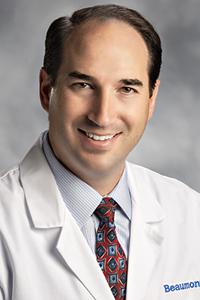Physicians need to learn more about disordered eating behaviors in patients with diabetes, according to research led by a medical student from Oakland University William Beaumont School of Medicine.
“Physicians’ Knowledge and Attitudes of Disordered Eating Behaviors Among Patients with Diabetes,” was led by Nayiri Khatchadourian, M3.
Co-authors were Lowell Schmeltz, M.D., an endocrinologist and associate professor, OUWB; Michael Brennan, D.O, an endocrinologist and assistant professor, OUWB; and Virginia Uhley, Ph.D., a nutritionist and associate professor, Foundational Medical Studies, OUWB.
In short, the study highlights a “staggering” gap in medical education programs regarding training around disordered eating behaviors (DEBs), which essentially refers to unhealthy habits that are especially problematic for patients with diabetes, yet fall short of the criteria to meet “official” eating disorder diagnosis.
Schmeltz says the study starts at “the root of the issue — lack of physician knowledge or comfort” and addresses “a major problem that is often overlooked in the care of diabetes patients.”
“There is a lot of research that shows patients are at higher risk of disordered eating behaviors,” says Khatchadourian. “But (before this study) there was no study to assess whether or not physicians, especially endocrinologists who are managing patients with diabetes, are educated about this during anytime of their training.”
‘Significant medical complications’
Khatchadourian is from Los Angeles and earned an undergraduate degree from UCLA and a master’s in public health from George Washington University.
She co-authored a book in 2018 called “The Price of Success: Understanding the Cost of Getting a College Degree.” The book stresses the importance for college student of self-care through diet, exercise, and meditation.
Nutrition and eating disorders have always been of interest to her, she says. In fact, Khatchadourian plans to specialize in psychiatry upon graduation from OUWB.
“Physicians’ Knowledge and Attitudes of Disordered Eating Behaviors Among Patients with Diabetes,” is the result of her seeking a project related to nutrition and eating disorders for her Embark project.
Embark is a required scholarly concentration program of OUWB that provides a mentored introduction to research and scholarship. The four-year longitudinal curriculum consists of structured coursework in research design and implementation, compliance training, research communication, and scholarly presentation, with protected time to develop mentored projects in a wide-range of community and health-related settings.
Given her interest in the topics of nutrition and eating disorders, Khatchadourian says she wanted to pursue a related topic for her Embark project.
This particular project fit the bill perfectly, she says, because the relationship between patients with diabetes and food is a complex one, primarily due to the impact of having to micromanage and track everything they eat.
“Eating becomes a lot of work for them and that makes them hyper-focused on what they’re putting into their bodies, so that they’re at higher risk,” says Khatchadourian. “Also with this population, it’s generally not good to develop disordered eating behaviors…. you could have significant medical complications.”
‘A huge problem’
Research for the study began with development of a short survey intended to take no more than five minutes to complete.
The team received responses from 34 endocrinologists with up to 35 years of experience.
Of those, about 59% reported not having received any education about identifying or assessing for DEBs among patients with diabetes. About 68% said that they did not believe they have the tools or resources available to assist a patient with DEB.
 |
| Schmeltz |
“The takeaway from this project is that there is a significant gap in physician knowledge around eating disorders in patients with diabetes,” says Schmeltz. “They don't need to become experts but should be screening patients regularly for signs of eating disorders and know what resources are available to assist them (dietitians, certified diabetes educators, psychologists, etc.).”
“Addressing eating disorders directly will often overcome barriers to improving diabetes control and therefore reduce the future risk of diabetic complications,” he adds.
Khatchadourian says the team has talked about two big changes that could come about as a result of the study.
One, the team has talked about incorporating three key questions that will always be asked when a doctor opens a patient chart.
And two, the team has talked about creating a continuing medical education module or video on the topic.
Khatchadourian also has been busy telling as many people as she can about the study.
Earlier this year, she presented the research at the ADA American Diabetes Association conference in New Orleans.
“It was very well-received,” she says. “I had a lot of endocrinologists stop by and say it’s a huge problem.”
She also talked about the research on a popular podcast produced by The Emily Program and Veritas Collaborative called Peace Meal, which is about eating disorders. She also uses social media to spread word of the study’s findings.
“Being an advocate is a huge thing for me…I’m trying to find interesting avenues to reach people,” she says. “I think it’s our responsibility to step into those spheres and platforms in order to provide more evidence-based information.”